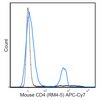The inhibition of hyaluronan degradation reduced pro-inflammatory cytokines in mouse synovial fibroblasts subjected to collagen-induced arthritis.
Giuseppe M Campo,Angela Avenoso,Angela D'Ascola,Michele Scuruchi,Vera Prestipino,Giancarlo Nastasi,Alberto Calatroni,Salvatore Campo
Journal of cellular biochemistry
113
2012
Show Abstract
Hyaluronan (HA) degradation produces small oligosaccharides that are able to increase pro-inflammatory cytokines in rheumatoid arthritis synovial fibroblasts (RASF) by activating both CD44 and the toll-like receptor 4 (TLR-4). CD44 and TLR-4 stimulation in turn activate the NF-kB that induces the production of pro-inflammatory cytokines. Degradation of HA occurs via two mechanisms: one exerted by reactive oxygen species (ROS) and one controlled by different enzymes in particular hyaluronidases (HYALs). We aimed to investigate the effects of inhibiting HA degradation (which prevents the formation of small HA fragments) on synovial fibroblasts obtained from normal DBA/J1 mice (NSF) and on synovial fibroblasts (RASF) obtained from mice subjected to collagen induced arthritis (CIA), both fibroblast types stimulated with tumor necrosis factor alpha (TNF-?). TNF-? stimulation produced high mRNA expression and the related protein production of CD44 and TLR-4 in both NSF and RASF, and activation of NF-kB was also found in all fibroblasts. TNF-? also up-regulated the inflammatory cytokines, interleukin-1beta (IL-1beta) and interleukin-6 (IL-6), and other pro-inflammatory mediators, such as matrix metalloprotease-13 (MMP-13), inducible nitric oxide synthase (iNOS), as well as HA levels and small HA fragment production. Treatment of RASF with antioxidants and specific HYAL1, HYAL2, and HYAL3 small interference RNA (siRNAs) significantly reduced TLR-4 and CD44 increase in the mRNA expression and the related protein synthesis, as well as the release of inflammatory mediators up-regulated by TNF-?. These data suggest that the inhibition of HA degradation during arthritis may contribute to reducing TLR-4 and CD44 activation and the inflammatory mediators response. | 22234777
 |
















